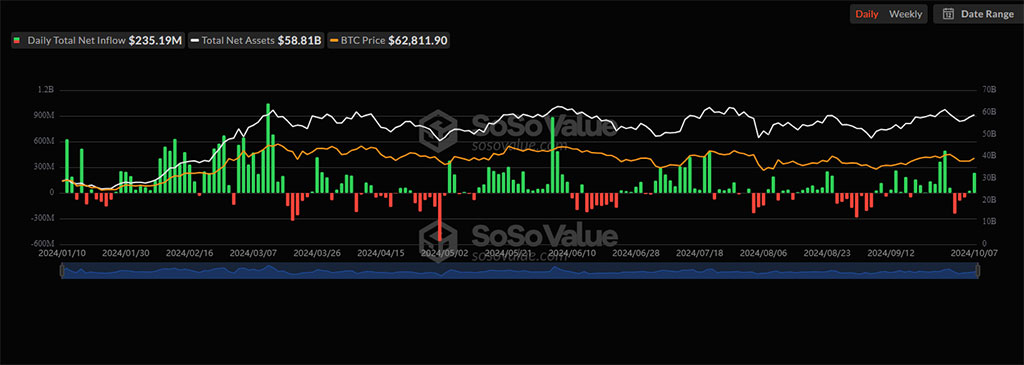ARTICLE AD
The divergence in the performance between Bitcoin and Ethereum ETFs underscores the unique market conditions each faces.
Key Notes
Bitcoin ETFs attracted $235.19 million in inflows on October 7, 2024, with no funds in red.Fidelity's FBTC and BlackRock's IBIT led inflows, adding $103.68 million and $97.88 million respectively.Ethereum ETFs saw no inflows or outflows, indicating cautious investor sentiment toward Ethereum products.Digital investment products witnessed a remarkable influx of capital into Bitcoin ETFs, while Ethereum ETFs maintained a steady course. According to the latest data from SoSoValue, the Bitcoin ETF market experienced a robust increase, with $235.19 million channeling into these funds on October 7, 2024, with none of the funds in red.

Photo: SoSoValue
Fidelity and BlackRock Lead with $201.56 Million Combined Inflows
Among the leaders, Fidelity’s Wise Origin Bitcoin Fund (FBTC) captured the largest portion, adding $103.68 million to its assets. This inflow boosts its total net contributions to nearly $10 billion. Close on its heels, BlackRock’s iShares Bitcoin Trust (IBIT) amassed an impressive $97.88 million, elevating its total net inflows to a staggering $21.66 billion.
Other notable contributors included Bitwise’s Bitcoin ETF (BITB) and ARK 21Shares Bitcoin ETF (ARKB), which attracted $13.09 million and $12.53 million respectively. Even smaller funds like the VanEck Bitcoin ETF (HODL) and Invesco Galaxy Bitcoin ETF (BTCO) saw positive movements, suggesting a broad-based investor interest across various fund offerings.
In contrast, Ethereum ETFs demonstrated a calm demeanor with no new inflows or outflows recorded on the same day. This stability occurred despite a modest trading volume of $118.43 million, suggesting a cautious stance among investors towards Ethereum-based investment products. This was only the second instance of such neutrality in the market’s history.
The subdued activity in Ethereum ETFs might raise concerns regarding their attractiveness or the timing of their launch. However, the overall performance of these funds suggests they are holding steady amidst a tumultuous year marked by significant crypto, financial, and geopolitical upheavals.
Distinct Paths of Bitcoin and Ethereum ETFs
The divergence in the performance between Bitcoin and Ethereum ETFs underscores the unique market conditions each faces. BlackRock’s Head of Digital Assets, Robbie Mitchnick, during a conference in Brazil, aptly categorized Bitcoin as a “risk-off” asset similar to gold, providing a stable investment alternative.
In contrast, he positioned Ethereum as a “risk-on” asset, akin to US stocks, highlighting its potential as a long-term technological investment.
Mitchnick’s perspective illuminates the fundamental differences between the two leading cryptocurrencies. Bitcoin is often seen as a less inflationary option compared to traditional fiat currencies, maintaining its appeal as a hedge against inflation.
Disclaimer: Coinspeaker is committed to providing unbiased and transparent reporting. This article aims to deliver accurate and timely information but should not be taken as financial or investment advice. Since market conditions can change rapidly, we encourage you to verify information on your own and consult with a professional before making any decisions based on this content.

With over 3 years of crypto writing experience, Bena strives to make crypto, blockchain, Web3, and fintech accessible to all. Beyond cryptocurrencies, Bena also enjoys reading books in her spare time.


 1 month ago
6
1 month ago
6 

